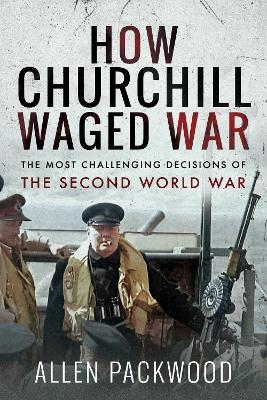
How Churchill Waged War
Frontline Books (Verlag)
978-1-5267-7109-4 (ISBN)
When Winston Churchill accepted the position of Prime Minister in May 1940, he insisted in also becoming Minister of Defence. He was not going to play the chairman's role, adjudicating between the competing claims of the ministers below him. He was going to get his hands dirty and take direct personal control of the day to day running of military policy. This, though, meant that he alone would be responsible for the success or failure of Britain's war effort. It also meant that he would be faced with many monumental challenges and utterly crucial decisions upon which the fate of Britain and the free world rested.
One of his first agonising decisions was how to respond to the collapse of France, and the danger posed to Britain's survival should the powerful French fleet fall into German hands. When he ordered Admiral Sommerville to sink the French fleet at Mers-el-Kebir, he knew that France might be turned against Britain, but that act demonstrated to the world that he was determined to wage war �whatever the cost may be'.
With the limited resources available to the UK, Churchill had to decided where his country's priorities lay. Should he concentrate on the defence of the realm or take the war to the enemy - and where should any offensive action be focused? Did Egypt and the war in North Africa take precedence over Singapore and the UK's empire in the East? How much support should be offered to the Soviet Union? How much of the direction of the war could he allow to be dictated by the United States?
In this insightful investigation into Churchill's conduct during the Second World War, Allen Packwood, the Director of the Churchill Archives Centre, enables the reader to share the agonies and uncertainties faced by Churchill at each crucial stage of the war. How Churchill responded to each challenge is analysed in great detail and the conclusions the author draws are as uncompromising as those made by Britain's wartime leader as he negotiated his country through its darkest days.
ALLEN PACKWOOD BA, MPhil (Cantab) FRHistS, is a Fellow of Churchill College, Cambridge, and the Director of the Churchill Archives Centre. Allen was co-curator of �Churchill and the Great Republic', a Library of Congress exhibition, which ran from February July 2004, and of �Churchill: The Power of Words', a display at the Morgan Library in New York from June to September 2012. Allen has also organised many events and lectures, including the successful conference on �The Cold War and its Legacy', staged over two days at Churchill College in November 2009, and attended by senior representatives from China, Germany, Romania, the Russian Federation and the United States. He is the author of several articles, co-wrote the publication accompanying the Library of Congress display, edited the recent guide to the Churchill Archives Centre, and has lectured extensively on Churchill in the United Kingdom and the United States.
| Erscheinungsdatum | 27.08.2019 |
|---|---|
| Zusatzinfo | 16 black and white illustrations |
| Verlagsort | Barnsley |
| Sprache | englisch |
| Maße | 156 x 234 mm |
| Themenwelt | Geisteswissenschaften ► Geschichte ► Allgemeines / Lexika |
| Geschichte ► Allgemeine Geschichte ► 1918 bis 1945 | |
| Geisteswissenschaften ► Geschichte ► Regional- / Ländergeschichte | |
| Geschichte ► Teilgebiete der Geschichte ► Militärgeschichte | |
| Sozialwissenschaften ► Politik / Verwaltung | |
| ISBN-10 | 1-5267-7109-8 / 1526771098 |
| ISBN-13 | 978-1-5267-7109-4 / 9781526771094 |
| Zustand | Neuware |
| Haben Sie eine Frage zum Produkt? |
aus dem Bereich


